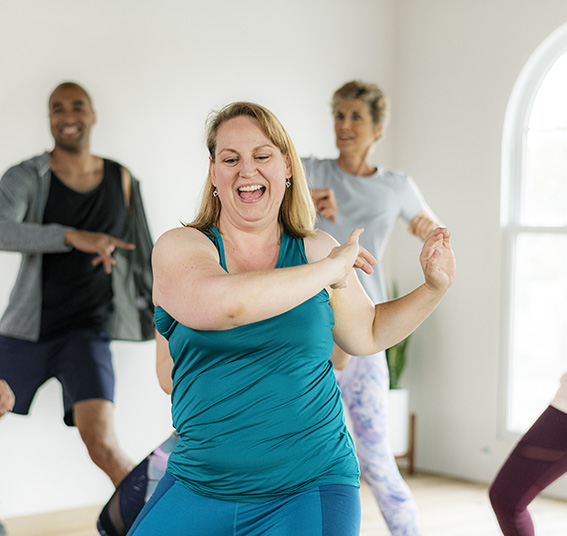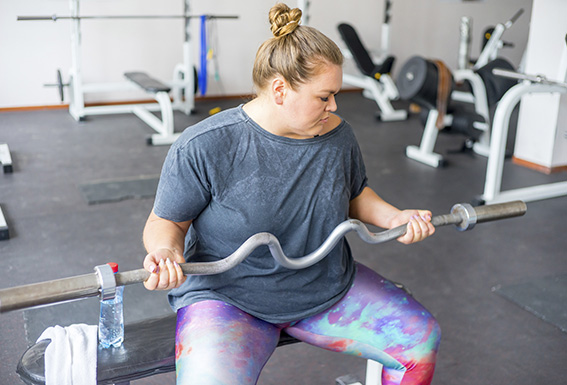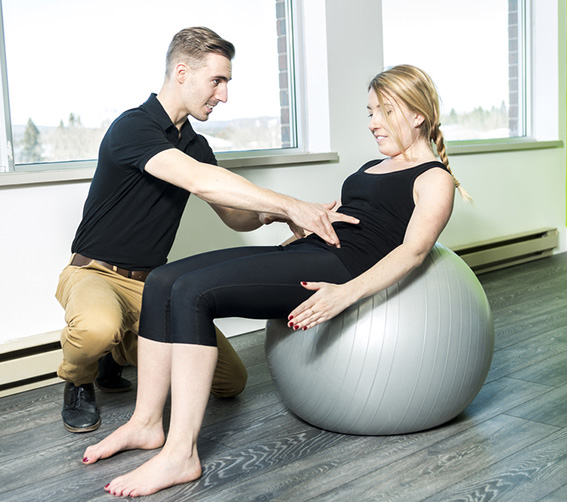Rethinking ‘Exercises for Disabled Adults’
Doctors and other health professionals (like our exercise physiologists here at Active Ability) often recommend that people with disability find ways to incorporate more physical activity into their everyday routines.
There’s a good reason for this: regular exercise is a proven way to promote physical health, mental health and wellbeing. While it’s true that exercise is crucial for regaining or maintaining your level of function and independence, finding the right physical activity program to meet your unique goals and needs can be difficult, especially if you have an injury or disability.
Much of the advice you read online will often over-simplify things. It will usually offer generic examples of ‘exercises for disabled adults’ that may or may not work for you, depending on your lifestyle and goals.
At Active Ability, we support people with disability to achieve greater independence, improved health and wellbeing and a better quality of life. We specialise in working with people with intellectual disability, neurological conditions and mental health issues.
Our experienced and dedicated team of allied health professionals don’t see anyone as being defined or limited by a health condition. Rather, we look at all our clients as individuals and tailor our fitness programs to suit your personal needs, goals and preferences.
Read on to learn more about how we go beyond providing fitness for ‘handicapped persons’ or exercises for ‘disabled’ adults, to supporting you to achieve your functional goals and participate at home, school, work and in your community.
The importance of fitness for people with disability
According to figures from the Australian Bureau of Statistics, there were 4.4 million Australians with disability in 2018, or just under 18 percent of the population. Disability prevalence increases with age, from one in nine people aged 0-64 years to one in two people aged 65 years and over.
Perhaps more important to note is the two-way connection between disability and chronic disease. In other words, people with disability are more likely to have a chronic disease, and people with a chronic disease are more likely to have a disability. We explain this in our post about why exercise physiology is important for people with disability.
When exploring exercise considerations for a disabled person, it’s vital that this link with chronic disease is kept in mind.


The link between chronic disease, fitness and disability
Physical fitness is crucial for optimum health and wellbeing – physically and mentally. It also helps to ward off chronic diseases such as diabetes, obesity and cardiovascular disease.
This makes exercise even more important for people with disability, who often have more than one chronic condition, such as high blood pressure, weight problems and high cholesterol.
However, the nature of disability can mean you have mobility issues that make it more difficult to participate in physical activity. In turn, lack of physical activity leads to the development (or worsening) of chronic disease such as cardiovascular disease, stroke, diabetes and osteoporosis.
It’s also vital to consider the role of mental health, as both disability and chronic disease are associated with depression.
Furthermore, mental health issues can make it more difficult for you to follow a healthy lifestyle in terms of diet and exercise, leading to a downward spiral.
Importantly, poor physical and mental health can negatively impact your ability to study, work and participate in social and community activities.
Implementing a safe, effective and tailored exercise program is an ideal way of supporting your physical and mental wellbeing and therefore your independence and ability to participate in activities that are important to you.
An exercise physiologist can tailor an exercise program to support better health, function and quality of life.
Why we don’t think of our clients ‘handicapped persons’
While there is much interest in how providing exercises for ‘disabled adults’ or ‘handicapped persons’ can improve quality of life, we feel that this is the wrong approach. Instead, at Active Ability, we look at you as a whole person, not simply at your disability or health condition.
When it comes to improving health outcomes, there’s no one-size-fits-all approach to fitness for disabled adults, because this ignores the most important aspect of all – you and your needs and goals.
When we’re designing exercise programs for people with disability, our qualified exercise physiologists and physiotherapists treat you with dignity and respect.
We’ll start by listening to your needs and concerns, taking into consideration your medical history and current functional level. Then we’ll work with you to create realistic, achievable goals for achieving greater health, independence and capacity to participate in things that are meaningful to you.


We don’t do exercise for ‘the disabled’: our people-focused approach
To break the mindset of offering exercises for ‘disabled’ adults, Active Ability focuses on you and your lifestyle.
Along with safe, effective physical activity programs, this may include support to implement a more nutritious diet or manage an injury or chronic pain. We’ll help you put these changes in place, monitor your progress and update your program as needed as you get closer to achieving your goals.
To help ensure that healthy changes are embedded into everyday life, we work with you in the convenience of your home, or at your school, workplace, gym or other meaningful environment.
Our physiotherapists, dietitians, and other health professionals can visit you wherever you are in the Sydney or Wollongong area, and offer evidence-based practice suggestions for everything from improving mobility to managing pain levels through fitness and nutrition. In this sense, we don’t provide exercises for the disabled – our approach is far more holistic and personal.
At Active Ability, there are no exercises for disabled adults, only physical activity and nutrition programs customised to suit your unique range of abilities and strengths.
Click here if you’d like to learn more about how our team of experienced health professionals can help you achieve your health and wellbeing goals and get more out of life.
Or you can get in touch with our friendly team on (02) 8678 7874, hello@activeability.com.au or via our contact form